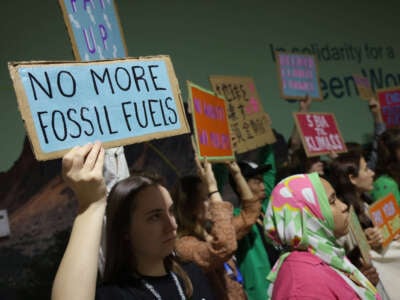"This opposition to strong international law on climate justice categorically undermines the Biden administration's climate legacy," said Ashfaq Khalfan of Oxfam America.

U.S. State Department legal adviser Margaret Taylor is pictured at an International Court of Justice hearing on December 4, 2024.
(Photo: Robin van Lonkhuijsen/ANP/AFP via Getty Images)
Jake Johnson
Dec 05, 2024
COMMON DREAMS
The Biden administration faced backlash from scientists, advocacy groups, and vulnerable Pacific islands on Wednesday for arguing before the United Nations' highest court that the Paris agreement is sufficient and countries should not face additional legal obligations to fight the climate emergency.
The U.S. position, outlined at the International Court of Justice (ICJ) by State Department legal adviser Margaret Taylor, was deemed "morally bankrupt" by Oxfam America, which decried the administration's insistence that "countries do not have clear legal obligations to reduce carbon pollution, especially as it prepares to turn over the executive office to a proven climate denier like President-elect [Donald] Trump."
"This opposition to strong international law on climate justice categorically undermines the Biden administration's climate legacy," Ashfaq Khalfan, Oxfam America's climate justice director, said Wednesday. "The U.S. has today denied any firm obligation to reduce carbon pollution to safer levels, phase out fossil fuel production, or provide funding to lower-income countries to help with renewable energy and protection from climate harms. Governments have failed to do what is necessary to protect humanity from the climate crisis, and it is essential that the ICJ holds them to account by pushing them towards concrete action to ensure climate justice."
Taylor argued during her presentation in The Hague on Wednesday that "the U.N. climate change regime, with the Paris agreement at its core, is the only international legal regime specifically designed by states to address climate change" and that "cooperative efforts through that regime provide the best hope for protecting the climate system for the benefit of present and future generations."
While technically a legally binding international treaty, the Paris accord has failed to arrest the rise of planet-warming carbon emissions, which have surged to an all-time high this year. The agreement—from which the U.S. is expected to withdraw for a second time under Trump—has no enforcement mechanism, and its language leaves ample room for countries to continue burning fossil fuels at levels that scientists say are incompatible with a livable future.
"The U.S. is content with its business-as-usual approach and has taken every possible measure to shirk its historical responsibility, disregard human rights, and reject climate justice."
Delta Merner, lead scientist for the Science Hub for Climate Litigation at the Union of Concerned Scientists, criticized the U.S.—the largest historical polluter—for resisting "calls for climate accountability" at Wednesday's ICJ hearing.
"Instead of taking responsibility for its contributions to the climate crisis, the United States used its 30-minute slot to downplay the role of the courts for global climate action, emphasize nonbinding national commitments under the Paris agreement, and reject the notion of historical responsibility," said Merner. "By framing climate change as a collective action challenge without clear legal obligations for individual states, the United States dismissed the potential for redress or binding accountability measures that advance justice for climate-vulnerable nations."
"In the face of stonewalling from major polluters, we applaud the leadership of Vanuatu and others for advancing this process," Merner added. "These proceedings must continue to center the voices of frontline communities."
The Pacific island of Vanuatu first launched the push for an ICJ advisory opinion on climate in 2021. Less than two years later, the U.N. General Assembly approved a resolution calling on the ICJ to issue an opinion on countries' legal obligations regarding the global fight against climate change.
Ralph Regenvanu, Vanuatu's special envoy for climate change and environment, criticized the U.S. presentation at Wednesday's landmark hearing and said treaties such as the Paris agreement can't be "a veil for inaction or a substitute for legal accountability."
"These nations—some of the world's largest greenhouse gas emitters—have pointed to existing treaties and commitments that have regrettably failed to motivate substantial reductions in emissions," said Regenvanu. "There needs to be an accounting for the failure to curb emissions and the climate change impacts and human rights violations that failure has generated."
Vishal Prasad, director of Pacific Islands Students Fighting Climate Change, expressed outrage at what he described as "a disheartening attempt by the U.S. to evade its responsibilities as one of the world's largest polluters."
"The U.S. is content with its business-as-usual approach and has taken every possible measure to shirk its historical responsibility, disregard human rights, and reject climate justice," Prasad added
ICJ Hearings Offer New Chance to Get Rich Countries to Pay for Climate Crisis
The UN’s court will soon clarify nations’ legal responsibility to avert the human rights impacts of climate catastrophe.
By Schuyler Mitchell ,


As Summit Ends in Cop-Out, Can Social Tipping Points Change Climate Trajectory?
COP29 fizzled out as catastrophe looms. Could a mass change in political consciousness still stave off the worst? By Gareth Dale , Truthout November 22, 2024
Ahead of the hearings, the Center for International Environmental Law released a report outlining the human rights and legal basis for states and corporations to provide reparations for harm caused by the climate crisis. While the ICJ hearings mark a historic development, as the report outlines, it isn’t the first time that an international body has weighed in on the legal obligations of states and corporations to mitigate climate harm.
“Under international law, those whose human rights are violated have a right to remedy, including full reparation for climate-related harms,” the report’s authors wrote. “Existing national, regional, and international reparation mechanisms provide precedents and examples from which experience could be drawn for repairing climate harm.”
One of these examples can be found in the case Billy et al. v. Australia. In May 2019, a group of Indigenous Torres Strait Islands residents filed a petition to the UN, arguing that Australia’s failure to reduce greenhouse gas emissions and cease fossil fuel extraction would render their home islands uninhabitable in less than 15 years.
“The Authors have a deep concern that their culture and way of life, which is intimately linked with their land and sea territories in the Torres Strait, is gravely threatened by the effects of climate change and sea level rise in particular,” the Torres Strait Islanders wrote in their petition. “Unless urgent action is taken, climate change is predicted to make their islands uninhabitable within their and their children’s lifetimes.”
A UN committee decided in September 2022 that Australia had violated the group’s right to life under the International Covenant on Civil and Political Rights. The UN asked Australia to adequately compensate the Torres Strait Islanders for the harm inflicted, marking the first time an international tribunal found a country responsible for climate harm under human rights law.
Other international courts have issued rulings against states for their complicity in environmental harm and ordered reparations. In La Oroya v. Peru, the Inter-American Court of Human Rights — the human rights tribunal for American states — ruled this March that Peru had failed to control toxic industrial pollution from a mining complex in the Andes.
Families in the town were exposed to heavy metals and carcinogens in their soil, air and water for 100 years, and the town’s children have tested positive for dangerously high levels of lead in their blood. The Inter-American Court of Human Rights found that the community’s exposure to the harmful pollution amounted to a human rights violation, and, crucially, ordered the state to implement both individual and collective reparations. This includes environmental remediation, free specialized health care for residents, relocating families who wish to move, tightening air quality standards and creating a system for tracking environmental quality data in mining areas.
In May, the International Tribunal for the Law of the Sea, an independent judicial body established by UN convention, became the first international court to issue an advisory opinion on the climate crisis. The court ruled that human-caused greenhouse gas emissions are a form of marine pollution and found that states have a legal obligation to take measures to curb emissions.
These cases are among those that set important legal precedents for the hearings in front of the ICJ this month. And the hearings couldn’t arrive at a more crucial time: The UN Climate Change Conference, COP29, recently concluded in Azerbaijan with a disappointing and paltry climate finance deal. Climate justice activists and negotiators from Global South nations had called for wealthy countries to provide at least $5 trillion a year to help poor countries adapt to the climate crisis and decarbonize their economies. But COP29 negotiators instead inked a final agreement of $300 billion — a bitter outcome that one activist said was “a drop in the ocean compared to what is needed” and another negotiator called a “travesty of justice.”
In the face of COP29’s failures, human rights and climate advocates are hoping that international law could be another tool in the climate action toolkit, compelling rich countries to pay reparations for the climate disasters that they’ve played an outsize role in causing.
Of course, one might wonder: Even if the ICJ concludes that countries should face legal consequences for climate-based human rights violations, will world leaders actually listen? How would those consequences be enforced?
Notably, Australia rejected the UN’s findings in Billy et al. v. Australia and has neglected to pay the Torres Strait Islanders compensation. And the power of international law feels particularly precarious amid the U.S. and its allies’ unbridled and ongoing support for Israel’s genocide in Gaza. President Joe Biden’s administration has said it will not limit arms sales to Israel, despite well-documented evidence that Israel has committed human rights abuses. The International Criminal Court, the UN’s other top court in The Hague that prosecutes war crime cases against individuals, recently issued arrest warrants for Israeli Prime Minister Benjamin Netanyahu and former Defense Minister Yoav Gallant — warrants that the U.S. and other Western nations have either rejected or ignored.
However, even though the ICJ’s opinion is nonbinding, it provides authoritative guidance and is expected to be cited in future climate litigation and negotiations. The hearings have already received an unprecedented level of participation, and the fact that the issue of climate justice made its way to one of the world’s highest courts, thanks to a youth-led grassroots movement, shouldn’t be discounted.
Given the magnitude of the crisis, every tool, every effort, counts. Basically, this is the first step in a long struggle for equitable climate action under international law. But we need a lot more than one step — hopefully, by the time the rest of the steps come, it won’t be too late.
This article is licensed under Creative Commons (CC BY-NC-ND 4.0), and you are free to share and republish under the terms of the license.

Schuyler Mitchell is a writer, editor and fact-checker from North Carolina, currently based in Brooklyn. Her work has appeared in The Intercept, The Baffler, Labor Notes, Los Angeles Magazine, and elsewhere. Find her on X: @schuy_ler
The UN’s court will soon clarify nations’ legal responsibility to avert the human rights impacts of climate catastrophe.
By Schuyler Mitchell ,
December 4, 2024

A boy rides his bike through floodwaters occurring near high tide in a low-lying area near an airport in Funafuti, Tuvalu, on November 24, 2019.Mario Tama / Getty Images
Five years ago, a group of 27 law students at the University of the South Pacific came together and hatched a bold new plan to bring the issue of climate justice before the United Nations’ top court.
Pacific Islands Students Fighting Climate Change was born, and the youth-led group quickly grew to include more than 100 members from countries across the South Pacific. They were tired of world leaders failing to take aggressive action to curb greenhouse gas emissions and thereby fueling a climate crisis that disproportionately harms Pacific Island communities.
The law students decided to turn to international humanitarian law as a potential remedy, successfully rallying leaders of Pacific states to request an advisory opinion from the International Court of Justice (ICJ) on states’ legal obligations to prevent devastation wreaked by climate change. The opinion would set forth consequences for countries that violate human rights by causing significant harm to the world’s climate. In March 2023, the United Nations General Assembly unanimously adopted a resolution, spearheaded by the nation of Vanuatu, calling on the ICJ to issue the advisory opinion — the first time such a resolution has been passed with consensus.
The ICJ began public hearings at The Hague on December 2. Over the course of two weeks, the court will hear arguments from more than 100 countries and international organizations, including youth-led organizations and Indigenous groups, about what states are obligated to do to ensure the environment’s habitability and mitigate the climate crisis. While an ICJ advisory opinion is nonbinding, it marks the first time the UN’s highest court has been asked to clarify nations’ legal responsibility to prevent climate change.
Humanitarian groups have highlighted how the dangerous planetary temperature rise spurred by fossil fuel extraction threatens a range of fundamental human rights, including the right to health, food, housing and even life. Since 1850, rich countries, especially the United States, have contributed a disproportionate share of greenhouse gas emissions, while poorer countries are left to grapple with the climate crisis’s most devastating impacts.
Related Story
Five years ago, a group of 27 law students at the University of the South Pacific came together and hatched a bold new plan to bring the issue of climate justice before the United Nations’ top court.
Pacific Islands Students Fighting Climate Change was born, and the youth-led group quickly grew to include more than 100 members from countries across the South Pacific. They were tired of world leaders failing to take aggressive action to curb greenhouse gas emissions and thereby fueling a climate crisis that disproportionately harms Pacific Island communities.
The law students decided to turn to international humanitarian law as a potential remedy, successfully rallying leaders of Pacific states to request an advisory opinion from the International Court of Justice (ICJ) on states’ legal obligations to prevent devastation wreaked by climate change. The opinion would set forth consequences for countries that violate human rights by causing significant harm to the world’s climate. In March 2023, the United Nations General Assembly unanimously adopted a resolution, spearheaded by the nation of Vanuatu, calling on the ICJ to issue the advisory opinion — the first time such a resolution has been passed with consensus.
The ICJ began public hearings at The Hague on December 2. Over the course of two weeks, the court will hear arguments from more than 100 countries and international organizations, including youth-led organizations and Indigenous groups, about what states are obligated to do to ensure the environment’s habitability and mitigate the climate crisis. While an ICJ advisory opinion is nonbinding, it marks the first time the UN’s highest court has been asked to clarify nations’ legal responsibility to prevent climate change.
Humanitarian groups have highlighted how the dangerous planetary temperature rise spurred by fossil fuel extraction threatens a range of fundamental human rights, including the right to health, food, housing and even life. Since 1850, rich countries, especially the United States, have contributed a disproportionate share of greenhouse gas emissions, while poorer countries are left to grapple with the climate crisis’s most devastating impacts.
Related Story

As Summit Ends in Cop-Out, Can Social Tipping Points Change Climate Trajectory?
COP29 fizzled out as catastrophe looms. Could a mass change in political consciousness still stave off the worst? By Gareth Dale , Truthout November 22, 2024
Ahead of the hearings, the Center for International Environmental Law released a report outlining the human rights and legal basis for states and corporations to provide reparations for harm caused by the climate crisis. While the ICJ hearings mark a historic development, as the report outlines, it isn’t the first time that an international body has weighed in on the legal obligations of states and corporations to mitigate climate harm.
“Under international law, those whose human rights are violated have a right to remedy, including full reparation for climate-related harms,” the report’s authors wrote. “Existing national, regional, and international reparation mechanisms provide precedents and examples from which experience could be drawn for repairing climate harm.”
One of these examples can be found in the case Billy et al. v. Australia. In May 2019, a group of Indigenous Torres Strait Islands residents filed a petition to the UN, arguing that Australia’s failure to reduce greenhouse gas emissions and cease fossil fuel extraction would render their home islands uninhabitable in less than 15 years.
“The Authors have a deep concern that their culture and way of life, which is intimately linked with their land and sea territories in the Torres Strait, is gravely threatened by the effects of climate change and sea level rise in particular,” the Torres Strait Islanders wrote in their petition. “Unless urgent action is taken, climate change is predicted to make their islands uninhabitable within their and their children’s lifetimes.”
A UN committee decided in September 2022 that Australia had violated the group’s right to life under the International Covenant on Civil and Political Rights. The UN asked Australia to adequately compensate the Torres Strait Islanders for the harm inflicted, marking the first time an international tribunal found a country responsible for climate harm under human rights law.
Other international courts have issued rulings against states for their complicity in environmental harm and ordered reparations. In La Oroya v. Peru, the Inter-American Court of Human Rights — the human rights tribunal for American states — ruled this March that Peru had failed to control toxic industrial pollution from a mining complex in the Andes.
Families in the town were exposed to heavy metals and carcinogens in their soil, air and water for 100 years, and the town’s children have tested positive for dangerously high levels of lead in their blood. The Inter-American Court of Human Rights found that the community’s exposure to the harmful pollution amounted to a human rights violation, and, crucially, ordered the state to implement both individual and collective reparations. This includes environmental remediation, free specialized health care for residents, relocating families who wish to move, tightening air quality standards and creating a system for tracking environmental quality data in mining areas.
In May, the International Tribunal for the Law of the Sea, an independent judicial body established by UN convention, became the first international court to issue an advisory opinion on the climate crisis. The court ruled that human-caused greenhouse gas emissions are a form of marine pollution and found that states have a legal obligation to take measures to curb emissions.
These cases are among those that set important legal precedents for the hearings in front of the ICJ this month. And the hearings couldn’t arrive at a more crucial time: The UN Climate Change Conference, COP29, recently concluded in Azerbaijan with a disappointing and paltry climate finance deal. Climate justice activists and negotiators from Global South nations had called for wealthy countries to provide at least $5 trillion a year to help poor countries adapt to the climate crisis and decarbonize their economies. But COP29 negotiators instead inked a final agreement of $300 billion — a bitter outcome that one activist said was “a drop in the ocean compared to what is needed” and another negotiator called a “travesty of justice.”
In the face of COP29’s failures, human rights and climate advocates are hoping that international law could be another tool in the climate action toolkit, compelling rich countries to pay reparations for the climate disasters that they’ve played an outsize role in causing.
Of course, one might wonder: Even if the ICJ concludes that countries should face legal consequences for climate-based human rights violations, will world leaders actually listen? How would those consequences be enforced?
Notably, Australia rejected the UN’s findings in Billy et al. v. Australia and has neglected to pay the Torres Strait Islanders compensation. And the power of international law feels particularly precarious amid the U.S. and its allies’ unbridled and ongoing support for Israel’s genocide in Gaza. President Joe Biden’s administration has said it will not limit arms sales to Israel, despite well-documented evidence that Israel has committed human rights abuses. The International Criminal Court, the UN’s other top court in The Hague that prosecutes war crime cases against individuals, recently issued arrest warrants for Israeli Prime Minister Benjamin Netanyahu and former Defense Minister Yoav Gallant — warrants that the U.S. and other Western nations have either rejected or ignored.
However, even though the ICJ’s opinion is nonbinding, it provides authoritative guidance and is expected to be cited in future climate litigation and negotiations. The hearings have already received an unprecedented level of participation, and the fact that the issue of climate justice made its way to one of the world’s highest courts, thanks to a youth-led grassroots movement, shouldn’t be discounted.
Given the magnitude of the crisis, every tool, every effort, counts. Basically, this is the first step in a long struggle for equitable climate action under international law. But we need a lot more than one step — hopefully, by the time the rest of the steps come, it won’t be too late.
This article is licensed under Creative Commons (CC BY-NC-ND 4.0), and you are free to share and republish under the terms of the license.

Schuyler Mitchell is a writer, editor and fact-checker from North Carolina, currently based in Brooklyn. Her work has appeared in The Intercept, The Baffler, Labor Notes, Los Angeles Magazine, and elsewhere. Find her on X: @schuy_ler












